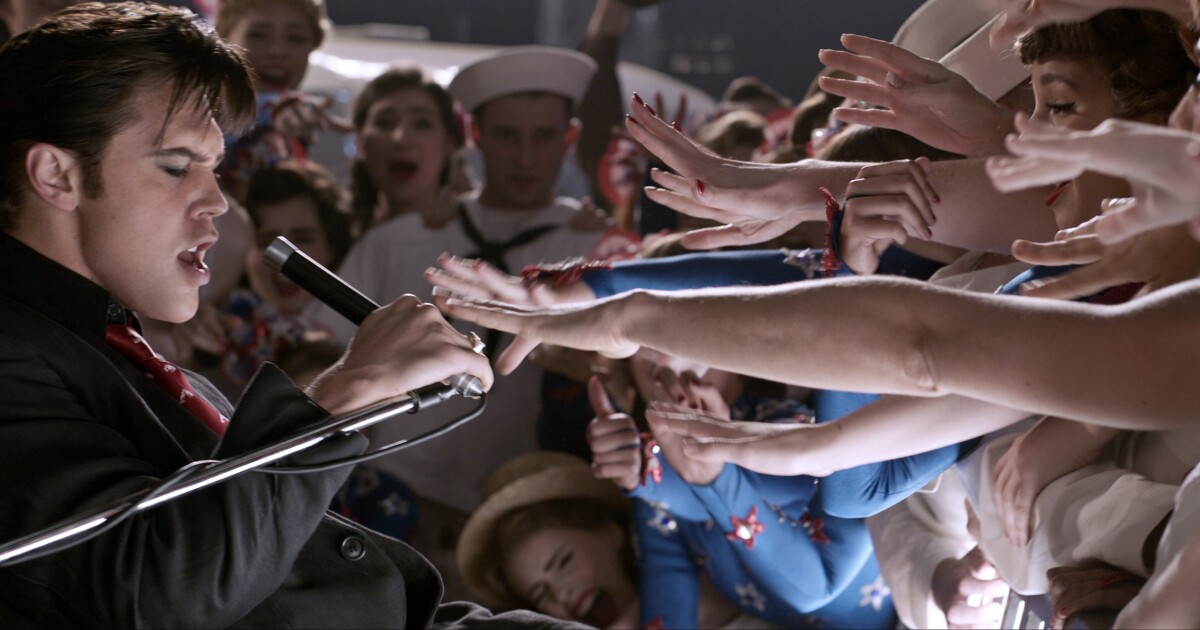So much has been written already about Baz Luhrmann’s “Elvis,” I went in with a lot of expectations and none. The result though is a movie that is uniquely moving and repelling at the same time. It’s fact free, and too long. But it’s also incredibly entertaining.
Every Baz Luhrmann movie is a triumph of style over substance, and “Elvis” is no exception. The first 20 minutes are so dizzying that you say to yourself, OK, if he can keep this up, I’ll buy it. But of course, he can’t sustain his own initial excitement because reality always sets in: what is this movie about, anyway? It can’t just be amazing photography and costumes.
The question becomes, who is this movie about? Elvis Presley or his manager, Colonel Tom Parker? After two and a half hours, I’m not sure I know the answer. I will say that Austin Butler’s performance as Presley is worth the price of admission. And Tom Hanks makes Col. Parker, who’s always been a subject of fascination in the music world, is as compelling as anything the two time Oscar winner has done.
If there’s a central problem it’s the screenplay. There are three credits: Luhrmann, Sam Bromell., and Craig Pearce. What they needed was a dramatist, someone to lay this massive amount of information out and shape it. Not once in all the screen time do we really learn who Elvis was, or anything new about the mysterious Parker except that he was a mystery wrapped in an enigma. Would it have been so hard to do a little sleuthing?
But Luhrmann isn’t interested in all that. He has such a strong visual concept, his mind can’t be cluttered by facts. We get some, but we also get a lot of fiction, some made up situations that “could have been true,” that kind of stuff. But you know, if you want the real story, there are biographies, and the old Kurt Russell TV film, among other sources. Luhrmann will send us there if questioned.
The set pieces are spectacular. The script concentrates heavily on the later years of Elvis’s life, the taping of his 1968 Christmas special, and his Las Vegas shows at the International Hotel. The early part of the film, his childhood, the 1950s, is glossed over quickly. Elvis goes to the Army, marries Priscilla, and the years between 1962 and 1968 are skipped over. We never get how Elvis managed in that time, what the Beatles and the British Invasion did to him.
Pretty much the only characters developed in any way as Elvis and the Colonel. Olivia DeJonge’s Priscilla simply isn’t written with any dimension. She’s a cypher. Watching the film you have no idea about Vernon, Elvis’s father and Richard Roxborough doesn’t help. Elvis’s assistant, Jerry Schilling, suddenly appears but you never know what he’s supposed to be doing.
“Elvis” comes down to Butler and Hanks. They are on a seesaw for two and a half hours. Parker is a snake, but Hanks gives him layers. (I didn’t mind the odd Dutch-esque accent. I think it worked.) If only Hanks had been given some history to play rather than imply. You see his eyes dancing with their own questions. He’s such a great actor, and gives the Colonel all that he’s got.
Butler is a revelation. His performances, the singing, the dancing, the gyrating, Elvis’s accent, all soar. If you liked Rami Malek as Freddie Mercury or Jennifer Hudson as Aretha, you will not to want to miss Butler’s work. He sings most of Elvis’s songs, and carries them off with aplomb. Sometimes he doesn’t look like he’s aged as much as Elvis did during the late 60s, but more often that not the makeup people do a fine job. Catherine Martin’s costumes — really.Elvis’s outrageous Vegas trappings — deserve their own movie.
Go see “Elvis” when it opens June 24th by all means. If you know nothing, you’ll glean the basic story. It’s not that hard. If you know a lot, you’ll be mesmerized by the many glittering pieces. Remember: Elvis’s music stands one way or another, and his “real” story is available with the stroke of a computer key. The rest is cinematic magic.

